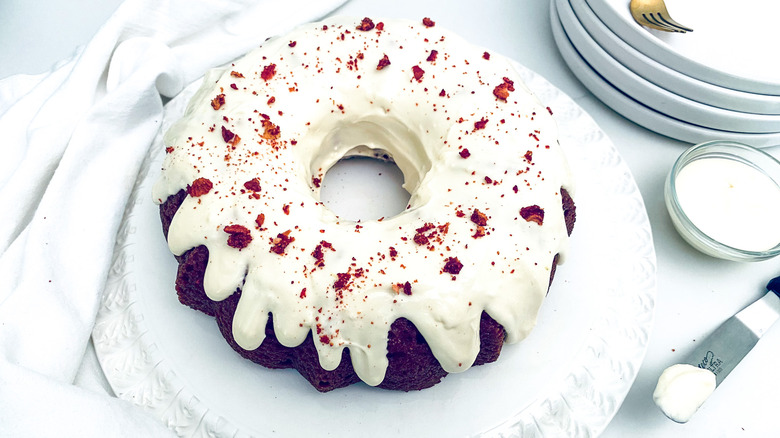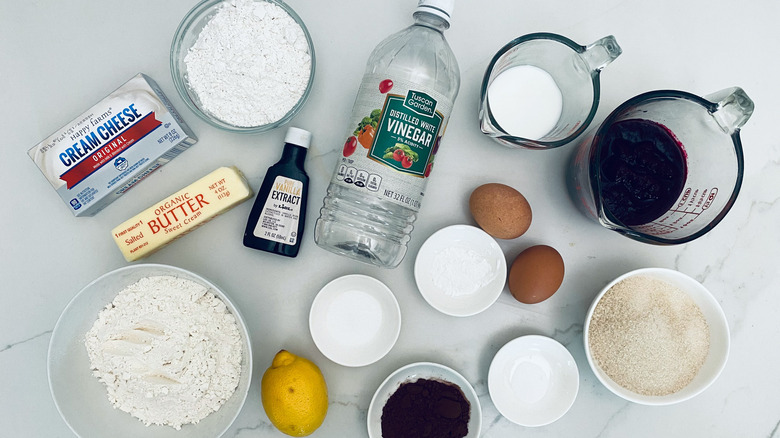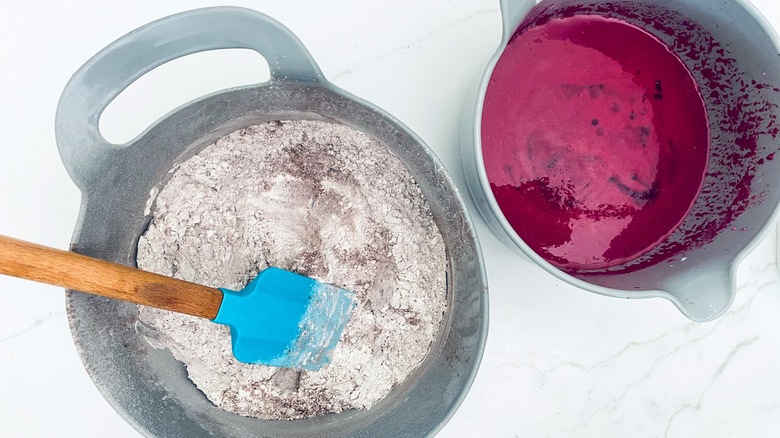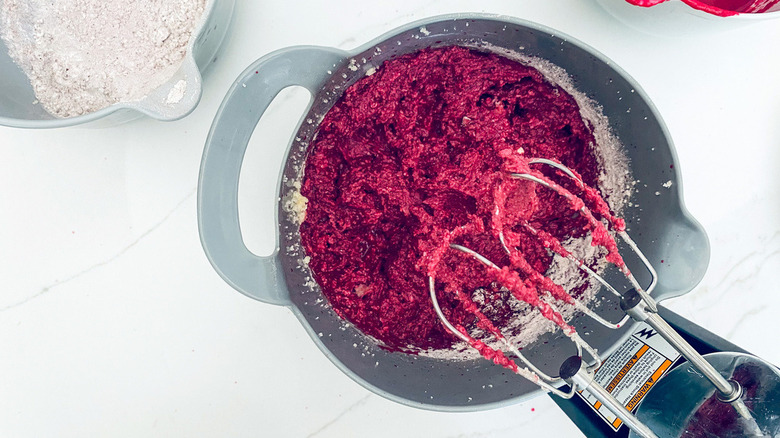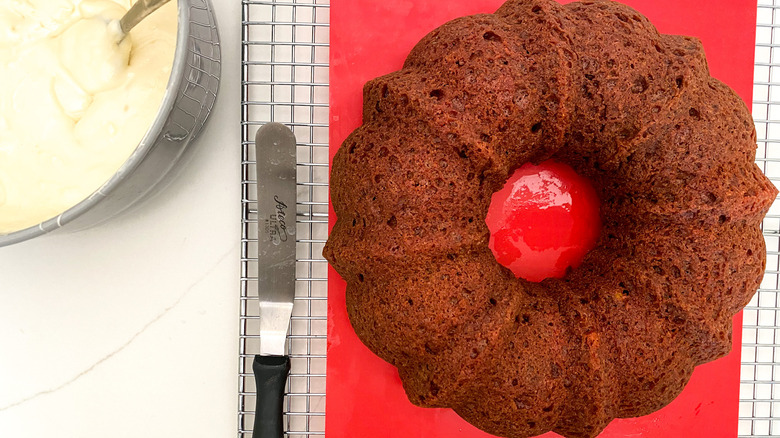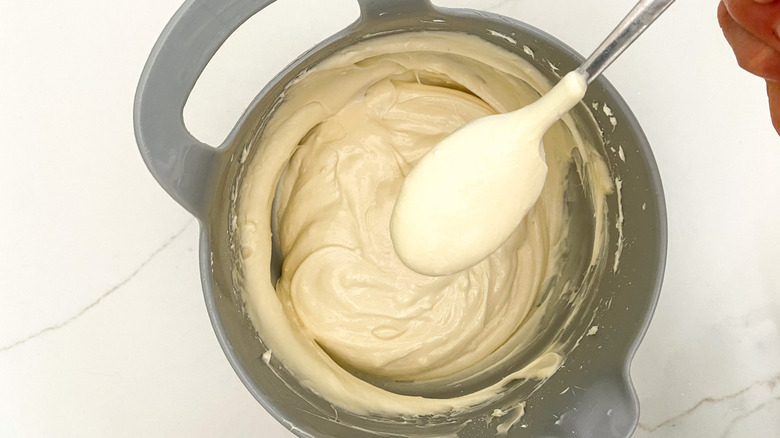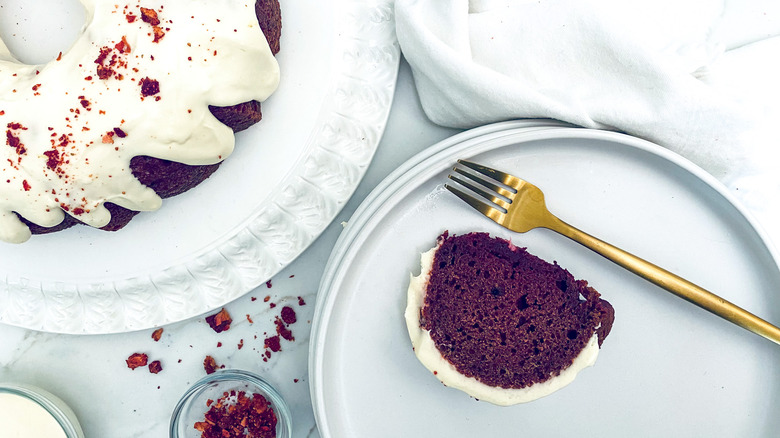Naturally Red Velvet Bundt Cake Recipe
What makes a red velvet cake so red? For most red velvet cakes these days, the cake's vibrant red color comes from food coloring, but in this naturally red velvet bundt cake from recipe developer and chef Deniz Vergara, it comes from pureed beets. "My favorite thing about making this recipe is the surprised look that people get when they hear beets are in the cake," Vergara says.
Red velvet cakes first began to appear in the early 1900s, and a chemical reaction between the cocoa and the acidic ingredients in the cake would give the cake a red hue. However, when cocoa became scarce during World War II, many bakers turned to beet juice to give their red velvet cakes the all-important red hue. This bundt cake is perfect for all occasions, and you can also make the cake ahead of time and store it easily in the refrigerator or wrapped in plastic wrap in the freezer.
Gather your ingredients for a naturally red velvet bundt cake
To make this naturally red velvet bundt cake, you'll need buttermilk, distilled white vinegar, and the juice of one lemon. You'll also need two room temperature eggs, all-purpose flour, Dutch processed cocoa powder, baking powder, sea salt, baking soda, vanilla extract, butter, and sugar.
And, of course, you'll need a beet puree, which you can get by steaming two medium beets then pureeing them with 1-2 tablespoons of water. The beets give the cake a deep red color without the use of any artificial food coloring. "Believe it or not, you can't taste the beets in this cake," Vergara says. "The earthy sweet beet puree gives this cake a red hue as well as a rich and fudgy texture."
To make the cake's cream cheese icing, you'll need cream cheese, butter, powdered sugar, and lemon juice.
Start making the cake
First, preheat your oven to 350 F. If you haven't already, steam the beets for about 5 minutes, then peel and dice them. Finally, puree them with 1-2 tablespoons of water to form a puree that is slightly thicker than applesauce.
Grease a bundt pan generously with butter and set it aside. Combine ¾ cup of beet puree, buttermilk, vinegar, lemon juice, vanilla extract, and eggs together in a medium-sized bowl and whisk them together until smooth. Finally, sift the dry ingredients: salt, flour, cocoa, baking powder, and baking soda, together in another bowl, and set it aside.
Mix everything together
Beat the butter until it is soft in the bowl of a stand mixer. Add the sugar into the bowl slowly, and beat the butter and sugar together until creamy, or about 3 minutes. Alternate adding half of the beet mixture with the flour mixture, starting with the beet mixture. Make sure to scrape down the sides of the bowl after each time you add the wet ingredients.
Bake the cake
Pour the batter into the greased bundt pan. Bake the cake for 40 to 45 minutes, or until a toothpick inserted into the thickest part of the cake comes out clean.
Make the icing
To make your cream cheese icing, beat the cream cheese until it's smooth using an electric mixer. Add the butter and beat it with the cream cheese until they are fully combined. Next, add the sugar and lemon juice. Continue to beat the ingredients together until they are smooth.
Serve and store the cake
Once you've removed the cake from the oven, let it cool, and iced it, your naturally red velvet bundt cake is ready to serve! "You can serve this cake for any occasion," Vergara says. "I recently made this cake for my [niece's] birthday because she loves red velvet!" If you too have a family member who loves red velvet cake, this recipe is sure to be a winner.
Naturally Red Velvet Bundt Cake
This red velvet bundt cake doesn't rely on food coloring to get that crimson hue - pureed beets get the job done in an all-natural way.
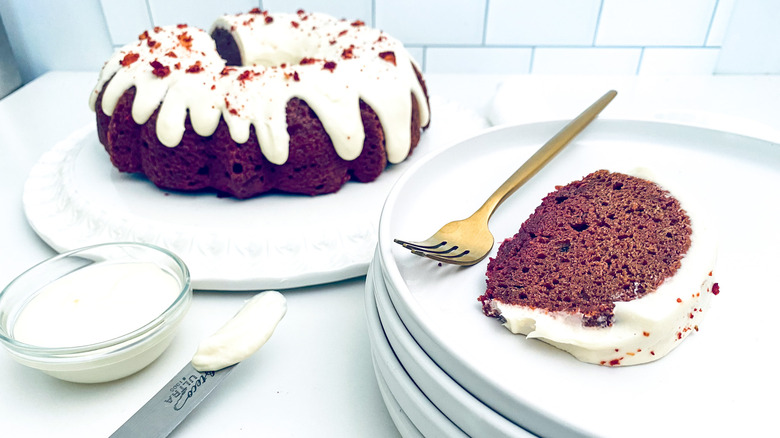
Ingredients
- For the cake
- 2 medium beets
- ¾ cup buttermilk
- 2 teaspoons distilled white vinegar
- 1 lemon, juiced
- 1 ½ teaspoons vanilla extract
- 2 eggs, at room temperature
- 2 cups all-purpose flour
- 3 tablespoons Dutch processed cocoa powder
- 1 teaspoon sea salt
- 1 teaspoon baking powder
- ½ teaspoon baking soda
- ¾ cup (12 tablespoons) butter, softened, plus more for greasing pan
- 1 ¾ cups sugar
- For the cream cheese frosting
- 8 ounces cream cheese, softened
- 4 tablespoons butter, softened
- 1 cup powdered sugar
- 4 tablespoons lemon juice
Directions
- Preheat the oven to 350 F. Grease the bundt pan generously with butter and set aside.
- Wash the beets and place them in the top of a steamer. Steam the beats until they are fork tender, about 5 minutes. Once cooled, peel and dice them.
- Puree the steamed beets with 1-2 tablespoons of water until the consistency is a little thicker an applesauce.
- Add ¾ cup of the beet puree into a medium-sized bowl with the buttermilk, vinegar, lemon juice, vanilla, and eggs, whisking until smooth.
- Sift together flour, cocoa, salt, baking powder, and baking soda in a bowl. Set the bowl aside.
- In the bowl of a stand mixer, beat the butter until soft. Slowly add sugar and beat until creamy, about 3 minutes.
- Alternate adding the beet mixture then flour mixture to the butter/sugar, scraping down the side of the bowl to fully combine all ingredients.
- Pour the batter into the greased bundt pan and bake for 40-45 minutes until a skewer comes out clean.
- Meanwhile, make the cream cheese frosting. Using an electric mixer, beat the cream cheese until smooth. Add the butter and beat until fully incorporated.
- Add the sugar and lemon juice. Beat until light and fluffy.
- Once the cake is cooled from the oven, frost the top of it with the cream cheese frosting.
- Slice and serve.
Nutrition
| Calories per Serving | 345 |
| Total Fat | 17.3 g |
| Saturated Fat | 10.4 g |
| Trans Fat | 0.2 g |
| Cholesterol | 65.3 mg |
| Total Carbohydrates | 45.1 g |
| Dietary Fiber | 1.2 g |
| Total Sugars | 31.4 g |
| Sodium | 259.5 mg |
| Protein | 4.1 g |
